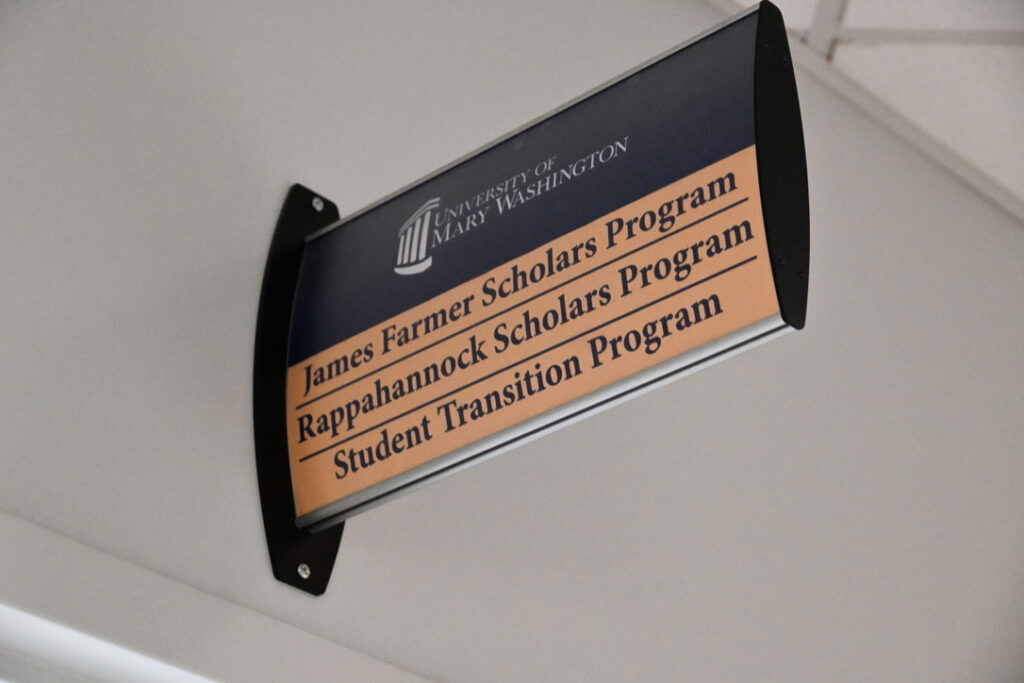Rappahannock Scholars Program expands into Student Transition Access and Retention Services with new funding
3 min read
The program has been an integral part of UMW since 2007 along with six other high schools. | Abbey Magnet, The Weekly Ringer
by MIHAUGHANY REDD
Staff Writer
Last spring, the Rappahannock Scholars Program was at risk of being discontinued as the grant that funded the program approached its expiration date. However, the grant’s recent renewal this spring—and a new grant from the State Council of Higher Education for Virginia—has allowed the program to continue and even expand.
“The major funding source for the [Rappahannock Scholars Program] was successfully renewed this year, along with the University being able to secure a fairly substantial grant funding from the state of Virginia,” said Director of the Rappahannock Scholars Program Justin Wilkes. “That grant is particularly for building more support and services for Pell-eligible and other historically marginalized students throughout their time here at the university.”
The program has been active at UMW since its establishment in 2007 and is a partnership between the university and six high schools in the Northern Neck of Virginia, including Fredericksburg. According to the program’s website, students “participate in monthly lessons and off-campus activities that prepare them to apply and attend the four-year college of their choice.”
If a student attending one of the partnering high schools is admitted to UMW as a Rappahannock Scholar, the program will also provide financial assistance based on their demonstrated need, according to Shanita Mitchell, the program’s assistant director.
Talk of the program potentially ending began last year, when it was uncertain whether the grant funding would be renewed.
“At that time last year, we were trending towards fading the program out,” Wilkes said.
“There was talk about it at the end of my sophomore year, spring semester,” said Paula Perez, a junior psychology major who’s been involved with the program since her freshman year of high school. “… But I didn’t think it would actually end.”
With this recently awarded grant, the Rappahannock Scholars Program’s office will be expanded into a larger program called Student Transition Access and Retention Services, or STARS.
“We are developing our office into a bigger program called STARS, so Student Transition Access and Retention Services,” said Wilkes. “With that, we will take on more initiatives for Pell-eligible students as well as first-in-the-family initiatives.” The Rappahannock Scholars and Student Transition programs will operate as usual, he said.
Given the additional new grant funding, Wilkes said they’re looking to expand the program.
“Right now we are exploring options for how we are able to [expand],” he said, “particularly looking at how the Rappahannock Scholars Program may be able to benefit students in the greater Richmond area who have similar demographic backgrounds and students in schools that are already in the pipeline.”
Despite the program’s uncertainty over the last year, Wilkes said he’s excited to continue helping students receive financial, academic and general support at UMW.
“We’re excited to continue planning the expansion, as we will continue to serve the Northern Neck and hope to pull in other areas with students from similar backgrounds,” he said. “We want to serve even more students the benefit of receiving financial, academic and general support while enrolled at UMW.”
In addition to providing financial support to its members, the program also helps students build connections with one another and with members of the greater UMW community. Rappahannock Scholars attend the Student Transition Program, a two-week summer program in which first-year students live on campus and attend college classes.
Perez attended STP and said the program helped her adjust to living with a roommate.
“It’s almost like a little summer camp, but it definitely helps you adjust and prepare you for how living on campus actually is,” she said.
Freshman Trinity Porter has received support from the Rappahannock Scholars Program since her senior year in high school. She said enjoys spending time in the Rappahannock Scholars’ office because of the community there.
“Working in the Rappahannock Scholars office/STP office, it’s pretty cool and a lot of people that come in there are familiar faces that you see every day,” she said. “It’s a nice place to study and just relax.”










